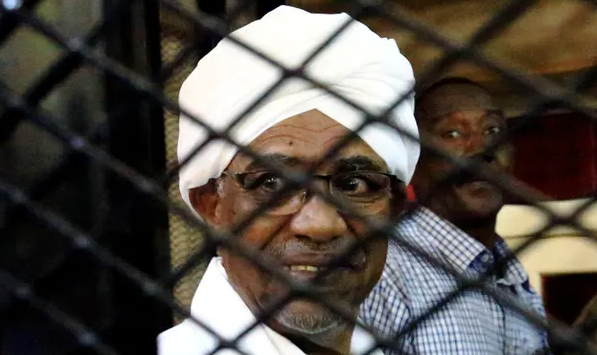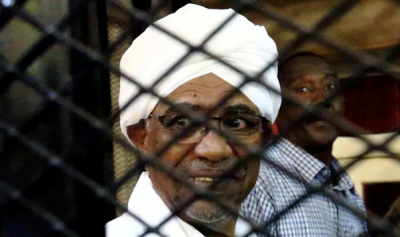Willow Beiridge, a history professor at Newcastle University, draws a connection between the current situation in Sudan, which is veering towards civil war, and the legacy of former Sudanese President Omar al-Bashir, asserting that his violent practices have greatly harmed the country.
The Islamic policy researcher, who recently prepared a book on "Hasan al-Turabi," noted in an article published today, Tuesday, in the British publication "The Conversation," that "since Sudan's independence in 1956, Sudanese people have experienced 35 coups and coup attempts, more than any other African country. When the uprising against former President Omar al-Bashir erupted in 2019 and a transitional civilian-military government was formed, Sudanese hoped for a transition to democratic governance." She continues: "But their hopes were dashed in October 2021 when Abdel Fattah al-Burhan led a coup against his civilian counterparts in the transitional government."
The latest round of conflict is the worst. Beiridge expresses concern that "the latest round of conflict, which began on April 15, 2023, heralds civil war, driven by security actors who benefited from the battle for Bashir's downfall." The researcher working at a peace institution states: "I have studied Sudanese politics for 15 years, and this latest round of conflict is the worst in modern history. There is no doubt that the legacy of Bashir's rule is at the center of this catastrophe. He controlled state institutions to serve his regime and chose conflict over settlement in dealing with politically marginalized groups in Darfur, western Sudan, and the south. He used force to cling to power, bolstered by his support for the 'Rapid Support Forces,' which were used to suppress regional rebels and the army."
She adds: "The legacy of Bashir continues to emerge today, as his former allies are rallying efforts to thwart the transition to civilian rule, under a framework agreement signed in December 2022 between the army and a coalition of civilian forces. In Beiridge's view, al-Burhan's fear of civilian attempts to curb military privileges has sustained key elements of Bashir's system, playing a divisive role in the current conflict."
She further states: "Part of Bashir's legacy relates to Islamic politics. This is the legacy that Mohamed Hamdan Dagalo, known as Hemeti, who heads the paramilitary force, sought to exploit for his benefit when he described al-Burhan as 'an extremist Islamist.' This characterization was promoted to appeal to Western powers." However, she notes: "To grasp the reality of what is happening on the ground, one must understand the ideological trajectory of Bashir's regime."
Regarding this regime, the researcher says: "When Bashir staged the coup in 1989, he acted as a representative of a cell in the army, controlled by the National Islamic Front, led by Hasan al-Turabi, who had managed the Sudanese Islamic movement since the 1960s. Thus, Bashir became frustrated by his failure to present his version of Islamic law through parliamentary means. Shortly after the coup, Bashir and Turabi began a process of empowering this policy, the legacy of which remains, allowing them to grant followers of Islamism and security heads willing to ally with them control over nearly every part of public life in Sudan. Officially, Bashir established an independent technocratic government, but in practice, power lay in a military-Islamic alliance that ran the country from behind the scenes."
She continues: "During the 1990s, Bashir undertook a purge of civil society organizations and independent political parties in Sudan. By the end of the decade, he had fallen out with Turabi. In 1999, he ousted him from the government, choosing handpicked representatives from the opposition in his regime in subsequent decades. He maintained the military-Islamic alliance as the foundation for the National Congress Party. In the 1990s, the Sudanese government hosted radical Islamists seeking to export revolution abroad and overthrow neighboring regimes. However, after his rift with Turabi in 1999, Bashir's regime sought to rehabilitate its international image by distancing itself from these armed groups and began cooperating with Western intelligence agencies."
She pointed out that "in Bashir's later period, the Sudanese government supported the Saudi-UAE coalition against the radical Islamic Houthis in Yemen, overseen by al-Burhan. When the latter emerged as a transitional military leader in 2019, he benefited from the perception of being a professional soldier more than an Islamist. His main interests aligned with the core interests of the army: maintaining his distinct social and political standing. Al-Burhan made political calculations in 2021 that the security heads and bureaucrats from the National Congress Party era were his best allies in the battle to prevent civilians from challenging the tightening grip of the army on the economy and the emergence of Hemeti's Rapid Support Forces as an alternative center of power. After seizing power, he appointed these former security heads to the government."
Beiridge emphasizes that while these leaders are largely not "radical Islamists," the West fears that for many Sudanese, their continued commitment to a distinctly defined Arab Islamic identity is divisive. After seizing power in 1989, Bashir insisted that his coup was a traditional military movement aimed at restoring order to public life. Even from his prison since April 2019, Bashir has maintained this narrative. The army that ousted him echoes the same scenario. Four months after the army removed Bashir, it signed a constitutional declaration with the main civilian coalition, the Forces of Freedom and Change."
Beiridge clarifies: "This led to the establishment of a transitional government shared between the army and the civilian coalition. The government formed a committee to dismantle the network of quasi-governmental charities, media institutions, and banks that enabled Bashir and his allies to maintain their grip on Sudan. However, al-Burhan's coup in 2021 disrupted that. The committee was disbanded and most of the prominent members involved were arrested. Yet, even before this coup, dismantling Bashir's regime posed a tremendous challenge."
She gives the example: "Under Bashir, the media was under the control of nominally independent owners who were, in practice, friends of the National Congress Party, who dominated the Sudanese economy." She concludes her research saying: "While Bashir may have fallen in 2019, his military successors have preserved much of the infrastructure of his regime. The remnants of that system continue to undermine the democratic transition in Sudan, with grave consequences ultimately."




